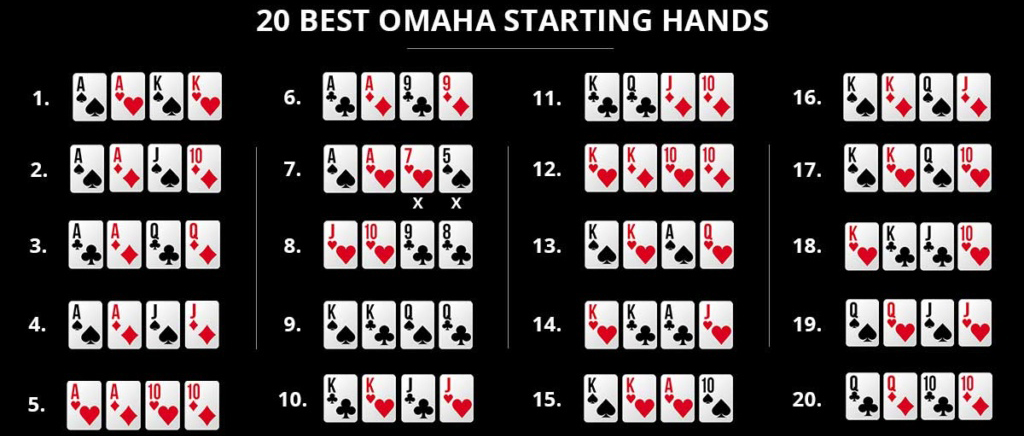
Omaha Poker is an exciting and popular variation of Texas Hold ’em. Unlike traditional poker, in Omaha, players are dealt four-hole cards instead of two, giving them more options to create a winning hand. While the basics remain the same as any other poker variant, some unique rules and strategies make playing Omaha different from any other game. Whether you’re just starting with Omaha or looking to brush up on your skills, this guide will provide all the information you need to know about playing this thrilling card game.
Learning the Rules of Omaha Poker
Omaha Poker is a fun and entertaining card game that can be enjoyed with friends, family, and other players. However, those new to the game may wish to learn the rules before diving in and having fun.
The basic rules of Omaha Poker are easy to master. Each player is dealt four cards face down, and five community cards are placed in the middle of the table. The goal is to create the best five-card poker hand by utilizing two of your private cards and three of the public community cards. The high hand wins half the pot at the showdown, while the low hand wins another half.
To ensure fair play, all players must understand Omaha Poker’s guidelines and limitations before making any bets. However, with knowledge and practice comes a skillset; therefore, taking time to learn first could be beneficial in building your strategy later while playing Omaha Poker.
Understanding Hand Rankings in Omaha Poker

Learning how to rank hands in Omaha Poker can be complicated for a beginner; however, understanding the basics is essential for success. Beginning with the highest ranking hand possible, two cards of one suit and two of another make up a “nuts” Royal Flush – meaning any other combination cannot beat it.
The second highest ranking hand is an Ace-high Straight Flush; it contains five straight cards of the same suit, with an Ace as its highest card. A Full House is composed of three matching cards and two non-matching cards, while both Four-of-a-Kind and Straight have four or five cards in consecutive order but does not all match.
Flushes are hands that are all of the same suits but not consecutive, and Three-of-a-Kind consists of three matching cards with two non-matching. Lastly, Two Pair consists of two matches between four total cards, and one Pair entails two matching cards with three non-matching ones. Whether you choose to play poker online or in person, becoming familiar with each hand’s organization will serve a player well in better understanding how to rank them relative to each other.
Reading Your Opponents and Making Calculated Bets
Omaha poker is an exciting game of chance, but these same risks can be mitigated through careful observation and sound betting. Experienced players will pay close attention to their opponents, analyzing their habits and tendencies to make calculated bets. In addition, studying verbal and physical cues, such as when a player agitates or rubs their hands together, can provide invaluable insight into the play style of fellow competitors.
Utilizing this information to inform betting action provides a greater chance at success while playing Omaha poker; with careful consideration and effort, anyone can become adept at making strategic bets based on the strengths or weaknesses of one’s opponents.
Knowing When to Fold, Call, or Raise
No matter your level of experience and ability in poker, an important skill to hone is knowing when to fold, call, or raise in the game of Omaha Poker. To excel, it is necessary to accurately assess a hand and research opponents who have acted before. This may require reading beyond the information provided that is visible on the table.
Sharpening these skills can lead to gains during cash games or tournaments by choosing which hands to play and both optimal and wise bets. Experienced players rely on the many tools available to assist in making profitable decisions for better results.
Using Position to Your Advantage in Omaha Poker
In Omaha poker, using position to your advantage is a strategy that can increase your chances of success dramatically. By choosing different types of hands and betting tactics depending on whether you’re in early, middle, or late position, you can work on developing an edge against your opponents.
Moreover, knowing how you are situated at the table gives you a better understanding of the dynamics and can help inform your decisions throughout the game. Utilizing position awareness is often more important than the cards in your hand, so it’s essential to invest effort into mastering this skill to succeed at Omaha poker.
Conclusion
The Omaha poker game can be challenging to navigate; however, the more you practice and familiarize yourself with the game, its rankings, betting styles, and opponents, the better your chances of winning a pot. Learning to read hands, understand position dynamics, and identify when to fold or raise is key to mastering this thrilling poker variation.






